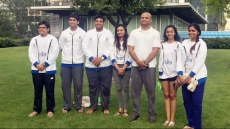When they see tourists from India, Tibetan monks reverentially greet them with a "Namaste". But beyond that, they don't say much.
The monks can be seen everywhere in Lhasa, the Tibetan capital, chanting Buddhist sutras with rosaries in their hands.
Beside them sit well-suited men with hands-free plugged into their ears. They keep a close eye on visitors.
The monks are one reason officials in the Tibetan government say there is religious freedom in Tibet.
"There is no restriction on practising religion here. People are free to practise Buddhism," Me Jiang, Vice Governor of Tibet and a Han Chinese, told a visiting IANS correspondent.
Monks can be seen aplenty at the majestic 13-storey Potala Palace - the chief residence of the Dalai Lamas until the 14th one fled to take exile in India in 1959.
The 7th century structure, which sits atop a hillock, is dimly-lit by yak butter lamps.
Believers offer customary white scarfs in an enclosure which once served as the court of Dalai Lama.
Jokhang Temple is another site which reveals how deeply Buddhism is entrenched in Tibet. Worshippers repeatedly prostrate themselves outside the temple.
On the streets, Tibetans clearly show a liking for Indians and their popular culture. Bollywood songs and actors are popular among the locals, many of whom keep posters of Rani Mukherjee and Kareena Kapoor in their homes.
But Tibet today is far removed from the Tibet the Dalai Lama escaped from.
As the Air China flight touches down at Lhasa airport, one can see over a dozen military choppers on one side of the runway.
But the excitement of reaching Tibet gives way to a slight headache and dizziness. It is natural to experience shortness of breath when you are at the "roof of the world" -- 3,656 metres above sea level.
The discomfort subsides when one sees sheep and yaks graze in alpine meadows and the long tunnels on the 57 km-long stretch between the airport and the city.
Closer to Lhasa flutter the Chinese flags. There are numerous posters of a smiling Chinese President Xi Jinping.

There are high-rise buildings, high-end cars ply in Lhasa and locals talk on iPhones.
The Chinese government seems to be trying every bit to change Tibet's image of being a restive region.
It is building infrastructure on a massive scale in Tibet: an expansive network of roads, the world's highest railway and multi-storey apartments in a difficult terrain.
China is bringing development to Tibet, home to 3.23 million people spread over 690 towns and over 5,000 villages.
However, there have been concerns of environment degradation in the region.
"Over the past few decades, the socio-economic developments have brought great changes in the lives of Tibetans," Yingxi Pingcuo, an official in the Tibetan government, told IANS.
Education, healthcare and job creation seem to be among the priorities of the Communist party.
Tibet has not been totally calm of course. Since 2009, some 140 Tibetans have set fire to themselves in protest against Chinese rule.
The Chinese government says these people were incited by the Dalai Lama, who lives in exile in India. Beijing calls him a "separatist".
With unemployment at 2.5 percent, the government is opening vocational training centres.
In one such centre in Lhasa hundreds can be seen acquiring skills ranging from the packaging of mineral water bottles to carving the Buddha on wood.
"Tibet has achieved a double-digit growth rate in the past two decades," said an official, Wang Niangdong. "We want Tibetans to be part of the mainstream."

Tibetans get a special place in educational institutes and other economic benefits.
Any discussion about the Dalai Lama, however, is off-limits here. When officials do talk about him, he is referred to as a "separatist" who "betrayed" his country.




